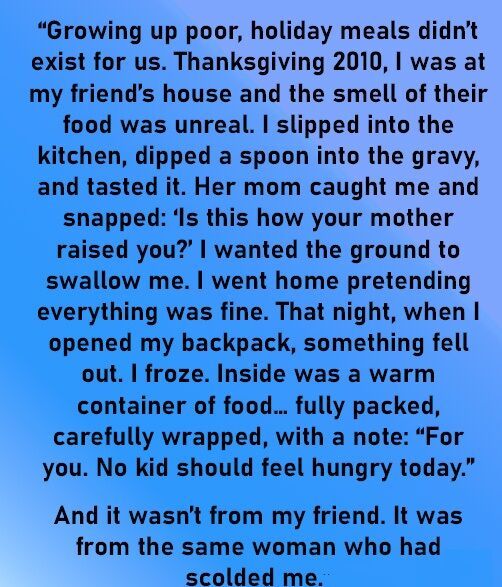In 2010, my friend Layla invited me to her family’s Thanksgiving dinner. I brushed it off at first. I told her I wouldn’t have time, that my mom needed me at home, that her family didn’t need another mouth to feed. She insisted. Layla had that way of speaking where you could tell she wasn’t offering a suggestion—she was giving you a lifeline. Eventually, I said yes, pretending it didn’t matter either way.
Walking into her house felt like crossing into a different universe. Warm rolls cooling on the counter. Turkey pulled straight from the oven. Homemade gravy simmering on the stove. Real mashed potatoes, not the powdered kind that come in a box. The entire kitchen smelled like the kind of holiday I’d only ever seen on TV. I tried to act casual, but the truth was embarrassingly simple: I had never stood in a room filled with that much food before.
Without thinking, I picked up a spoon and dipped it into the gravy pot. Just a taste, barely anything. But Layla’s mom turned around at that exact moment. Her voice was sharp, irritated, the kind of tone that makes you shrink. “Is this how your mother raised you?” she said. The words cut deeper than she probably intended. My face burned. I mumbled an apology and backed away, wishing the floor would open up and swallow me whole. I spent the rest of the evening eating quietly, laughing when it was expected, pretending everything was fine. But that moment stuck under my skin like a splinter.
Dinner ended. People said their goodbyes. I thanked Layla and her family, avoiding her mother’s eyes, and headed home. My mom was already at work, the apartment dark except for a lamp she always left on for me. I dropped my backpack on the bed and unzipped it, ready to grab my homework. Then I saw it.
Inside was a warm Tupperware container. Turkey. Stuffing. Mashed potatoes. A slice of pie. All carefully arranged like someone had taken time, real time, to think about what I might want later. On top of it sat a small, folded note in handwriting that didn’t belong to Layla.
No child should go hungry on Thanksgiving. – Mrs. R.
I just stared at it. I didn’t know what to make of the contradiction. The same woman who had scolded me like I’d crossed some sacred line had also packed an entire meal for me to take home. I sat on my bed and ate every single bite alone in the quiet, tears slipping down my face before I even realized I was crying. The food wasn’t what got me. It was the unfamiliar weight of being cared for, even in a rough, imperfect way.
My mom came home later that night, exhausted as always. She found me still awake, the empty container on my dresser. I told her what happened—the scolding, the note, the food. She listened without interrupting, then pulled me into her arms with a gentleness she saved for rare moments. “Sometimes kindness wears a hard face,” she said. “People help in ways we don’t always understand.”
Her words settled into me like a truth I had been needing for a long time.
For weeks, I avoided going back to Layla’s house. I told her I was busy, that I had errands, that my mom needed me. The truth was simpler: I didn’t want to face her mother again. I didn’t know how to reconcile the woman who had made me feel small with the woman who had fed me without asking for thanks.
December rolled in with cold mornings and early sunsets. Layla asked me to help decorate their Christmas tree. I hesitated, knowing I was running out of excuses. Finally, I agreed. I walked to her house with nerves crawling under my skin. At the door, I paused, half-expecting that same sharp tone waiting for me on the other side.
But when Layla’s mom opened the door, her face was soft, almost warm. She didn’t bring up Thanksgiving. She didn’t mention the food. She just handed me a delicate glass ornament shaped like a snowflake and told me to hang it wherever I wanted. No judgment. No tension. Just a simple gesture inviting me into her home like I belonged there.
In that small moment, the knot in my chest loosened. I realized then that the Thanksgiving incident wasn’t as clean as I’d made it in my mind. It wasn’t cruelty followed by kindness. It was a messy blend of both, tangled together in a way that felt painfully human. People aren’t one thing or another. They’re complicated. They react fast, sometimes too fast, and then they try to make it right in the only way they know how.
Looking back, that holiday shifted something in me. Not dramatically, not instantly, but enough to change the way I saw people. I learned that generosity doesn’t always come wrapped in softness. Sometimes it arrives clumsy, awkward, or hidden behind words that sting. Sometimes the people who push you away in one breath pull you closer in the next.
That Thanksgiving didn’t give me a picture-perfect memory. It gave me something more valuable: a reminder that kindness isn’t always obvious in the moment. Sometimes it looks like a scolding you didn’t deserve and a meal you didn’t expect. Sometimes it comes from someone who doesn’t know how to communicate softness but still feels compelled to help.
I carried that lesson with me long after the holiday lights came down. Long after Layla and I moved on with our lives. Long after the shame faded into something gentler. And even now, whenever I think about Thanksgiving, that’s the story that rises first—the awkward, imperfect, unforgettable moment when someone showed they cared in the only way they knew how.
